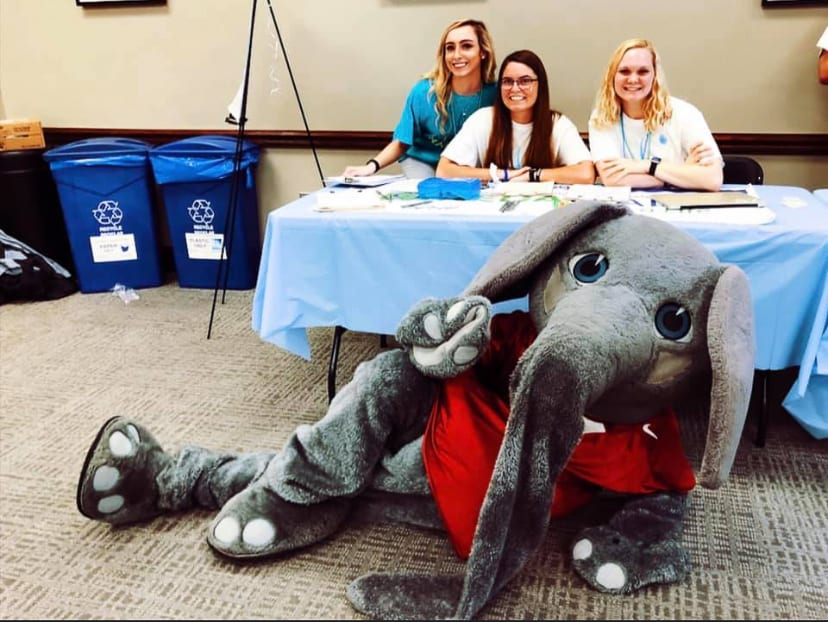Choices can be limited for students with eating disorders
October 21, 2019
For students struggling with eating disorders, it can be hard to find specialized, local care. Now, a new private practice in town is working to change that.
If you are a student who has an eating disorder or might be at risk of one, it may be difficult to obtain care in Tuscaloosa.
An eating disorder is a serious and psychological illness. Common eating disorders include anorexia nervosa, bulimia and Avoidant Restrictive Food Intake.
Mackenzie Baldwin is the leader of the University of Alabama’s National Eating Disorder Association and a senior majoring in addiction and recovery. She entered treatment for an eating disorder as a junior in high school and has since recovered.
“Here in the South, there are no resources,” Baldwin said. “The closest clinic is an hour away. It’s not easily accessible for students who need an intensive outpatient. They just still have to come to school. You really have to dedicate.”
Magnolia Creek Treatment Center for Eating Disorders is the clinic that is closest for Tuscaloosa residents. Baldwin said patients who need a clinic would typically visit three times a week. Baldwin thinks part of the problem, along with the lack of resources, is that mental health and eating disorders are taboo to talk about in the South.
Part of the National Eating Disorder Association’s mission is to start more conversations about eating disorders and encourage students to celebrate their bodies rather than looking at the limits.
Sheena Gregg is a registered dietitian and nutritionist with the Department of Health Promotion and Wellness at the University. In an email, she said students seeking medical assistance or nutrition therapy for an eating disorder can use the UA Counseling Center and Capstone Family Therapy Clinic.
The Student Health Center and Pharmacy has a registered dietician with 10 years of experience working in eating disorders. Students affected by eating disorders have also used the Women and Gender Resource Center, Collegiate Recovery and Intervention Services and the Office of Student Care and Well-Being.
Sometimes these services are limited in space and availability due to the fact that there are only two registered dietitians on staff at the Student Health Center. And according to Baldwin, counselors aren’t specialists in eating disorders. Then, students often have to look to outside sources – which in Tuscaloosa, are limited. Gregg noted that Birmingham offers several options for specialized care.
“We are lucky to be in close proximity to the Birmingham area, which has several eating disorder treatment centers that we often refer students to when needing a higher level of care,” Gregg said in an email.
Even with having Birmingham close by compared to other areas of Alabama, it can still be a hindrance for students without financial or health-care resources and without access to a car. With a student body as large as the University’s, and given the amount of students affected by an eating disorder nationally, limited resources can prove to be a real problem.
Gregg said there are no hard numbers for students affected at the University but according to data from the National Eating Disorder Association, 10-20% of college women and 4-10% of college men will be affected by an eating disorder.
Rebekah Gaydosh is a registered and licensed dietitian, president and CEO at Envision Dietetics, a private practice that recently opened in Tuscaloosa. She plans to mainly serve the college population.
“After graduating from UA and seeing the culture, I would say the media and the pressures of social media are the main causes, and wanting to have an appearance of having this put-together life.”
Gaydosh said there are limited resources for women – especially college-aged women – and there’s a need to give them resources to navigate the challenges of eating disorders.
“People with eating disorders are often very stubborn and they don’t want to get the help,” Baldwin said. “They don’t see it as a problem. They just see it as what it takes to get the body image and stay the same. They don’t care about the health factors.”
Baldwin is from Massachusetts and thinks that mental health and eating disorders are not really talked about in Tuscaloosa the same way they are talked about where she’s from.
“Having a mental illness doesn’t make you crazy,” she said. “It’s just something you struggle with.”
Mental health is something Baldwin is open about in efforts to take away the shame and stigma around eating disorders and mental health. Baldwin said putting her work into awareness with events and trying to bring healthy outlets for recovery has helped her own recovery.
“Finding the National Eating Disorder Association,” Baldwin said on what helped her after getting out of treatment. “… From there I was able to put all my thoughts from the eating disorder into the recovery world rather than into like, a toxic situation.”





















